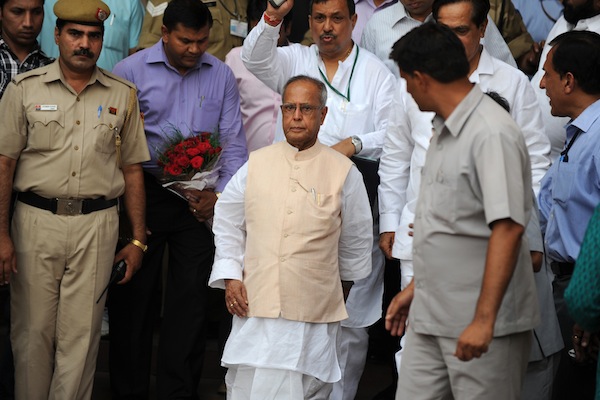The Indian president lives in a Lutyens palace formerly occupied by the country’s viceroys, replete with ballroom, cinema, and Mughal gardens. I’ve been inside to interview the current incumbent, Pratibha Patil. With 360 rooms, it’s a big house for a small person and you can get lost – indeed recently, Patil reportedly did go missing for three hours until located by a team of commandos. The Head of State is somewhat removed from the cut and thrust of Indian politics so presidential candidate Pranab Mukherjee is looking forward to relaxing there after the election on July 19, 2012.
Like an endlessly sliding Sid the Sloth in Ice Age, The Congress-led United Progressive Alliance government is holding on with the edge of its fingernails as it flounders in its second term. Corruption, inflation, currency weakness and an emerging mafia of powerful chief ministers have left it paralysed. Congress Party President Sonia Gandhi had to choose a candidate with unassailable credentials to win over the thousands of Members of Parliament and State Assemblies in order to get a friendly face elected to the nation’s highest constitutional post.
She badly needs a compliant pal in the president’s palace, for the commander-in- chief sometimes plays a critical role. Intimidating PM Indira Gandhi needed her president’s signature to declare a State of Emergency in 1975, the president’s word can be decisive during interim periods between unstable governments and he or she has the power to pardon.
Ace negotiator Mukherjee has accumulated unrivalled political capital after being in frontline politics for four decades. The 77-year old former finance minister was the Congress party’s trouble shooter and managed countless groups of ministers.
Having a presidential figure respected in India (also, by the way, in London, Washington, Berlin and Moscow) is the only option in the circumstances.
And though India’s growth rate has slid to around five per cent, it’s still a helluva lot higher than its British, European and American equivalents – one reason why, within the second half of 2010, five permanent members of the United Nations Security Council visited the country. Prime Minister David Cameron went selling with the biggest ever British delegation, aiming to boost bilateral trade to double its current strength of just under $12 billion. The 50 million or so in the Indian middle class is predicted to leapfrog by a factor of 10 by 2025, and is an attractive market. But the Indian government’s political paralysis means that the country can’t even open up more to foreign investment at the moment, a situation which is unlikely to change, whoever becomes the 13th President of India.
Rani Singh
Mukherjee can’t change India’s political paralysis






Comments